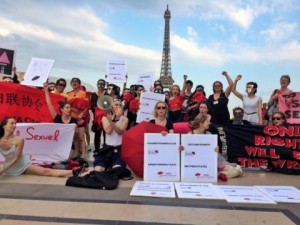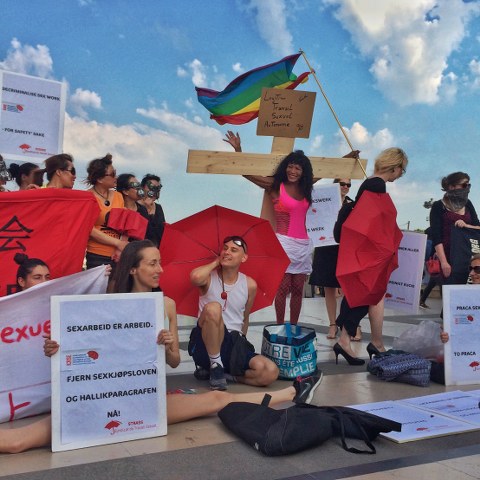SEX WORKERS FROM EIGHT EUROPEAN COUNTRIES GATHER TO NETWORK, SHARE STRATEGIES AND PROTEST AGAINST CRIMINALISATION OF SEX WORK, STIGMATISATION, POLICE REPRESSION

Watch video of the protest on Square of Human Rights here: https://www.youtube.com/watch?v=HO4LXOKLOcs
Article in French: http://www.liberation.fr/societe/2015/06/05/rassemblement-de-prostitues-a-paris-pour-defendre-leurs-droits_1324066
Translated in English: http://swannet.org/en/content/prostitutes%E2%80%99-rally-paris-defend-their-rights
Between the 4th and 6th of June 2015, sex workers and allies from many European countries gathered in Paris at the office of Medecins du Monde (Doctors of the World) to share information on their living and working conditions, the legal frameworks at national level and protest on the Square of Human Rights to demand an end to criminalisation, violence, police repression and imprisonment faced by sex workers across Europe.
Forty years ago, on the 2nd of June 1975, over a hundred of sex workers from the streets of Lyon occupied the church of St Nizier to demand an end to police corruption and harassment, and to protest against the violence and discrimination they were subjected to. Their slogan was “our children don’t want their mothers in jail!”.
This courageous action is seen as a symbolical birth of sex workers’ movement in Europe. The 2nd of June is celebrated as Sex Workers’ Rights Day in many countries around the world.
This year, to mark the 40th anniversary of this occupation and following days of meetings and protest in Lyon, we have gathered in Paris to share our experiences and expertise about our lives and our struggles.
Following a three day meeting with 15 organisations representing sex workers or supporting sex workers’ rights in eight European countries, sex workers also gathered at the Square of Human Rights to denounce the ongoing attacks against us. We condemn not only physical, psychological and verbal attacks, not only the murders and suicide that end tragically the lives of many of our colleagues but also the ongoing systematic and structural violence that silences us and wishes to make us disappear.
Sex workers internationally are demanding the decriminalisation of sex work. We need to be listened to. We, sex workers of all genders, from England, France, Germany, Ireland, Netherlands, Norway, Sweden, Scotland, many of us migrants from China and Romania, once more are speaking out and demand their voice to be heard.
We demand:
– End criminalisation including criminalisation of clients. International evidence shows that criminalisation makes us more susceptible to violence, health risks and exploitative working conditions, and limits our access to health and justice. In Norway, where clients are criminalised, governmental reports note the increased vulnerability of street-based sex workers. UNAIDS and World Health Organisation are both calling for the full decriminalisation of sex work: “States should move away from criminalising sex work or activities associated with it. Decriminalisation of sex work should include removing criminal penalties for purchase and sale of sex, management of sex workers and brothels, and other activities related to sex work.” (UNAIDS)
– Stop conflating trafficking and migration. Anti-trafficking legislation is most often used to target immigrant sex workers and stop people crossing international borders. Anti-trafficking measures have adverse impact on sex workers’ health, security and working conditions. Repeated police raids on sex work venues undermine sex workers’ safety, deprive them of earning opportunities, makes them prone to labour exploitation, and force them to work in clandestine in fear of arrest and deportation. Presented as a protective measures, anti-trafficking provisions contribute to sex workers’ vulnerability. “The conflation of sex work and trafficking, migration and mobility is no accident. It is not a misunderstanding of terminology but is a conscious attempt to abolish prostitution and prevent people, in particular women, from migrating for sex work.” (NSWP)
– Laws and policies should be based on evidence not ideology and morality. Biased researches and flawed methodology often lead to misconceptions about sex work and perpetuate stigma, discrimination and dangerous policies both at the national and European level.
– Listen to sex workers and our organisations. For many years, sex workers have self organised in informal collective, registered organisations, trade unions, regional and global networks. Our direct experience of the sex industry make us the best placed interlocutors to understand sex work and develop policies that respect our labour and human rights.
__________________________________________________________________________________
Voices of sex worker-led organisations and organisations fighting for sex workers’ rights across Europe:
“Rising poverty and austerity in the UK is pushing more people, particularly mothers supporting families, into the sex industry where we are being arrested, criminalised, imprisoned and for those of us who are migrant workers, deported. But the movement of sex workers for decriminalisation, safety and justice is growing, emboldened by the courage of our fellow sex workers in other countries.” Laura Watson, English Collective of Prostitutes, UK
“The Netherlands face secondary criminalisation through repressive legislation and over-regulation. We are convinced this needs to be tackled on EU scale. Very few cases of forced sex work are found yet nearly all regulation pivots around that.” Sex worker member of PROUD, The Netherlands
“Though sex work is legal in Germany, it is still far from being properly decriminalized. Sex workers still face lots of difficulties and hardships. It is still a highly stigmatized job and workers’ rights are not respected. Most sex workers are migrants and work under precarious conditions and an apparent self-employment. In addition, sex work is prohibited in many German city areas (mostly the city centre), and we are forced to work in the outskirts, without proper infrastructure. Instead of focussing on improving workers’ conditions and rights, sex worker organisations in Germany are unfortunately urged to fight upcoming laws, which will even worsen our situation: the government plans to introduce a mandatory registration, combined with obligatory health and psychological counselling of sex workers. These measures will drive many in the illegality as it deprives us of our anonymity, which is vital for our safety and to be able to engage in different life choices.” Sex worker, member of Hydra, Germany
“Sex workers in Scotland are facing increasing police raids and yet another attempt to criminalise the purchase of sex despite the fact that these proposals have been defeated several times over the past few years. Our organisation’s efforts to fight police harassment and campaign against the failed Swedish model distracts from what we really want to achieve, which is the full decriminalisation of sex work in Scotland and greater self-organising among sex workers.” Stewart, SCOT-PEP, Scotland
“On June 1st Northern Ireland passed a law to criminalise the purchase of sex, despite 98% of NI sex workers stating in a recent poll this is not what they need. Client criminalisation is part of a bill that has been proposed in the Republic and threatens to pass soon. We are mobilising to raise awareness about evidence showing criminalisation does not decrease demand nor deter crime. Meanwhile, with this law, our work is pressurized, we work in shadier environments/situations, and we have no rights to rely on for recourse.“ Kate, Sex Workers Alliance Ireland (SWAI), Northern Ireland
“‘Sex workers shall be met with care and solidarity’, said the representatives of the former government when they knocked through the ban on buying sex. Six years later sex workers are without legal protection and are constantly facing rights violations. They are both the target and the means of the police law enforcement. Sex workers are approached by undercover police officers pretending to be a customer; kicked out of their apartments; experience loss of deposit and prepayment; blacklisted on hotels; chased from the streets; exposed for their neighbours or other guest at the hotel and reported to child welfare system. Condoms and lubricants – considered as an important means preventing HIV and sexually transmitted infections before 2009 – are now criminal evidence of prostitution. Sex workers are more vulnerable to violence and robbery, but do not report it to the police anymore, because they want to stay away from ‘police radar’. Migrant sex workers who report rape and violence have been thrown out of Norway. Criminalisation has reinforced and increased stigma, sexism and racism against sex workers, where some groups are either being seen as easy target for robbery, rape, or exposed to hate crime. The criminal discourse dominates the political approach and reduces a complex phenomenon to a matter of effect of the law, while topics such as rights, health, social problems of or when sex work overlap with other marginalised groups or situation are thrown out with the bathwater.” Astrid, PION, Norway
“Let’s make one thing very clear; the Swedish Model does not decriminalize sex workers as every other activity connected with sex work is criminalized. It criminalizes sex workers through the backdoor at the same time as it fuels stigma and discrimination. This is just prohibition with a smarter PR strategy, nothing else.” Pye, Rose Alliance, Sweden

